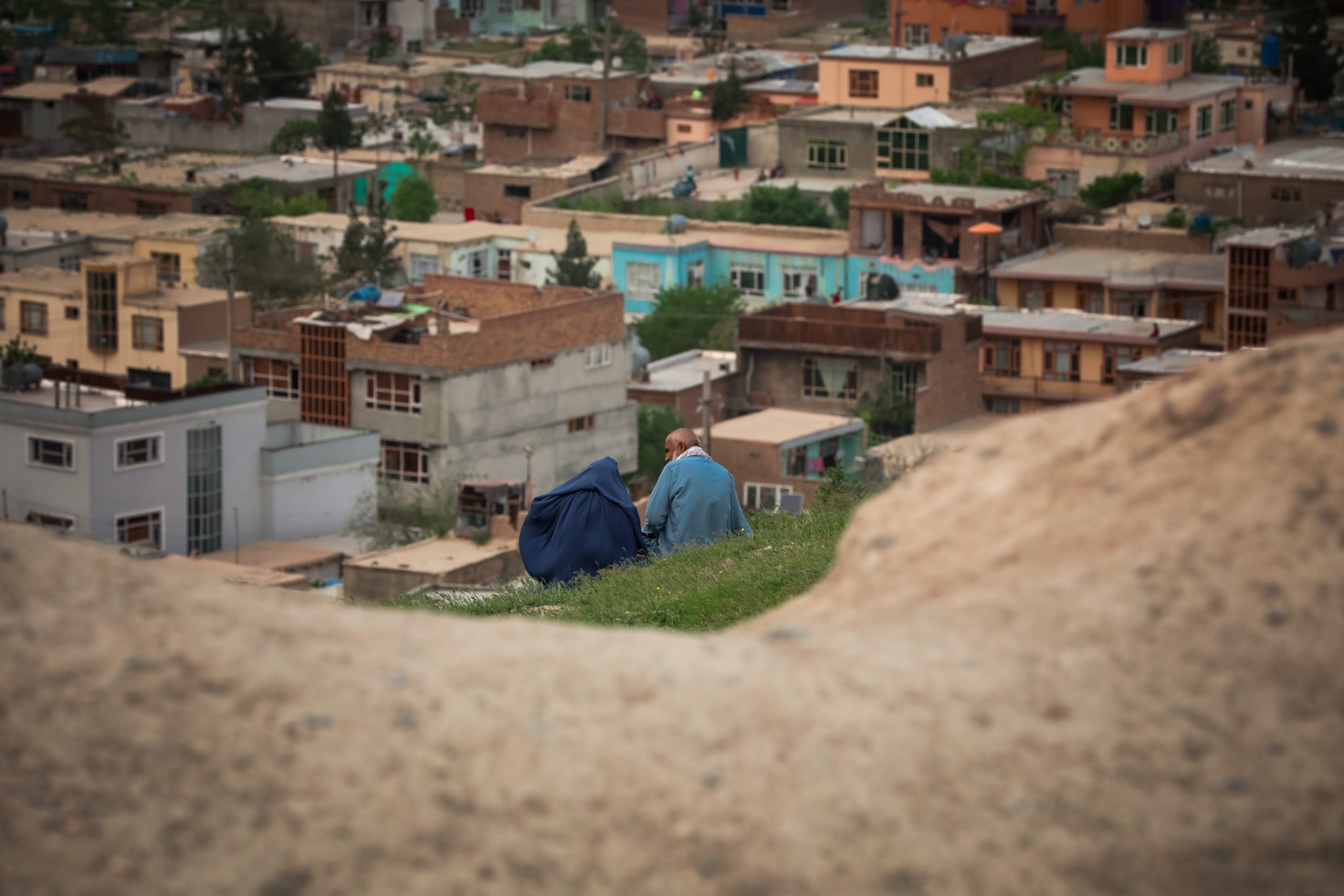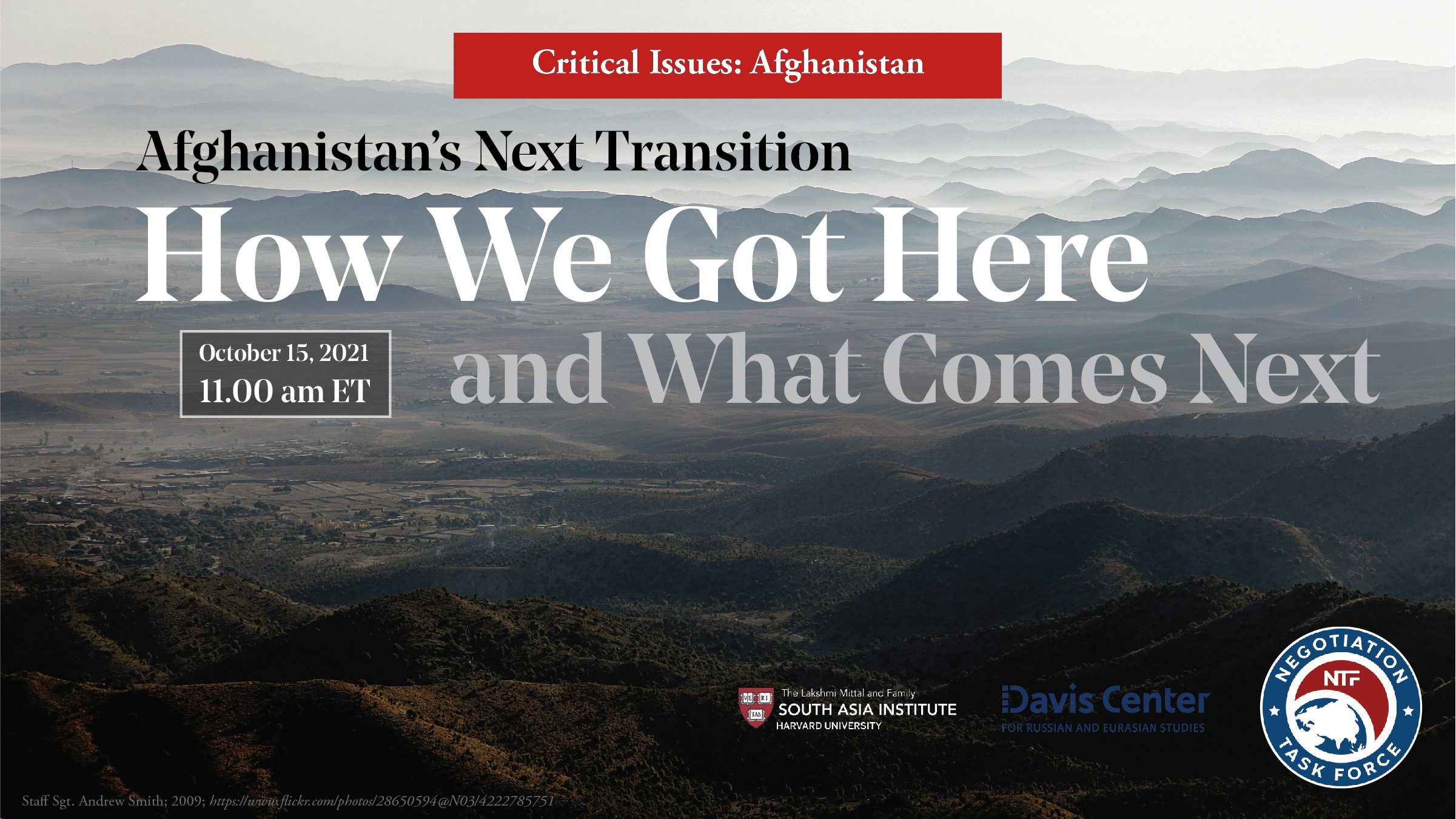
On Friday, October 15, the Mittal Institute and the Negotiation Task Force present “Afghanistan’s Next Transition: How we got here, and what comes next,” a focus on the US withdrawal from Afghanistan. Discussants will explore the lead up to the collapse of the Afghan government, and what the new Taliban regime means for the future of the country and its people. The event will be moderated by Arvid Bell, Director, Negotiation Task Force, Davis Center for Russian and Eurasian Studies; Lecturer, Government Department, Harvard University, and will feature panelists Anand Gopal, Journalist and Author; Fara Abbas, Fellow, Negotiation Task Force, Davis Center for Russian and Eurasian Studies, Harvard University; Former Director of Programs, National Security Council, Islamic Republic of Afghanistan; and Philipp Ackermann, Director General, Africa, Latin America, Near and Middle East, German Ministry of Foreign Affairs, and Former Civilian Head, Provincial Reconstruction Team Kunduz, Afghanistan.
Arvid Bell spoke with the Mittal Institute about his work, and what we can expect the panelists to cover at the October 15 event. Arvid is a scholar and entrepreneur who specializes in complex conflict analysis, negotiation strategy, and international security. He is lecturer on Government at Harvard University, Director of the Negotiation Task Force at the Davis Center for Russian and Eurasian Studies, and Partner at Negotiation Design & Strategy (NDS), a training, advisory, and research development group.

Arvid Bell.
Mittal Institute: Arvid, you are an expert in negotiation and crisis management, and were appointed to the inaugural cohort of Davis Center Scholar-Entrepreneurs for your ability to pioneer research, build new institutions, and mentor students. What drew you to this field in the first place?
Arvid Bell: I remember 9/11 as a moment that made me look differently at the world. I was a high school student in Germany and shocked about the terrorist mass murder. But when the United States and its allies intervened in Afghanistan, I was confused that the response to al-Qaida’s crime was violence. Yes, something had to be done, but was war the right answer? I was drawn into peace and conflict research. In graduate school in the United States, I uncovered negotiations as a powerful tool to manage and resolve conflict. A few years later, I co-founded a company (NDS) that creates tailored crisis simulations for government agencies, corporations, and other clients to help them prepare for a chaotic world. In 2019, I was appointed Lecturer at Harvard’s Government Department, and the Davis Center gave me the chance to build out a new program, the Negotiation Task Force, as part of their Scholar-Entrepreneur Initiative. The NTF applies a negotiation lens to security problems in the Euro-Atlantic and Eurasian sphere, including Afghanistan.
Mittal Institute: As you think about Afghanistan, and the changes that have occurred there as of late, what is your take on the US withdrawal? In your opinion, what challenges and opportunities did/does the operation face?
Arvid Bell: That’s one thing we are going to talk about on Friday. But your question already points to one problem: What kind of “operation” are we talking about? The war on terror and the Operation Enduring Freedom? Or state-building with the International Security Assistance Force? Or the promotion of democracy and human rights? And if the intervention was really about the latter, why did the West select local allies with dismal human rights records to build the new Afghan state with? I don’t think that it was destiny that Afghanistan is now again in the hands of the Taliban. People made decisions that got us there. We’re going to talk about how this happened.
Mittal Institute: Geographically, the withdrawal will have—or already has had—major implications on the rest of the region. Can you describe some of the waterfall effects we might see both in-country and beyond?
Arvid Bell: It is still unclear which factions within the Afghan Taliban will gain the upper hand, how much they will listen to other voices, and if there will be some sort of basic international consensus about how to deal with the “Islamic Emirate of Afghanistan” or not. The balance of power is being reshuffled in front of our eyes, both domestically and regionally. Various domestic factions in Afghanistan have external allies they can count on. Simply put, the United States, the EU, India, and their local partners have lost influence, Pakistan and China stand to gain, and for Russia, Iran, and the Central Asia republics, it’s too early to tell. Again, there is a chance that some basic international consensus emerges, ideally starting with an agreement in the UN Security Council. This could have a stabilizing effect on Afghanistan and the wider region and help avoid a new civil war.
The balance of power is being reshuffled in front of our eyes, both domestically and regionally. Various domestic factions in Afghanistan have external allies they can count on. Simply put, the United States, the EU, India, and their local partners have lost influence, Pakistan and China stand to gain, and for Russia, Iran, and the Central Asia republics, it’s too early to tell.
Mittal Institute: To stabilize the region, what do you hope or expect needs to happen?
Arvid Bell: First, more international coordination. Instead of everyone talking to the Taliban bilaterally and cutting all sorts of deals, the members of the UN Security Council should agree on an Afghanistan consensus. Important issues are in the hands of the UNSC, think about the removal of Taliban leaders from international sanctions lists, for example. The UNSC can define conditions for the removal of these men from the list, for example with regards to the protection of ethnic minorities in Afghanistan. Inclusive negotiations about the future of Afghanistan should include all domestic groups. This seems to be unrealistic right now. But those who win on the battlefield tend to overestimate their power to bend an entire country to their will. This was true for the United States in 2001 when they didn’t want to give the Taliban a place in the new political order. It looks like the Taliban are now making the same mistake by marginalizing non-Pashtuns, women, and progressive voices.
Mittal Institute: We look forward to the October 15 event. As moderator, what are the key topic areas you hope to tackle? What do you think this particular group of panelists brings to the discussion on Afghanistan that will make for a lively exchange and debate?
Arvid Bell: I would like to identify key factors that got us to where we are now. Fara Abbas worked for the Afghan government in Kabul up until the day it collapsed. Anand Gopal wrote a fascinating book based on his on-the-ground reporting in Afghanistan about the war. Philipp Ackermann was the civilian head of the Provincial Reconstruction Team (PRT) in Kunduz. We will hear three different perspectives on what went wrong during the past two decades, which opportunities were missed, and what might come next.

